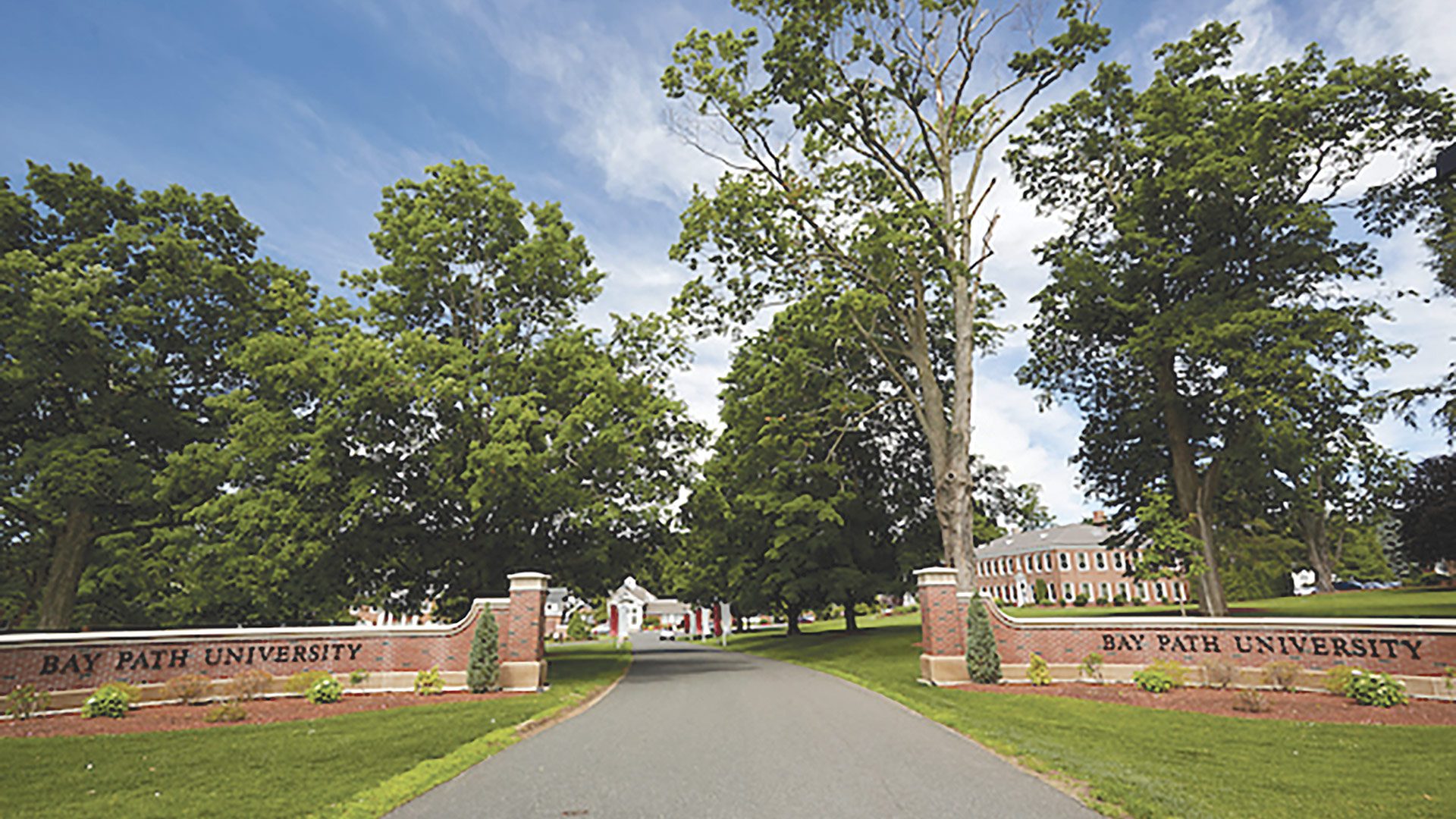A Bold Step Forward

Bay Path University President Sandy Doran
As she talked about how Bay Path University’s acquisition of Cambridge College came about — and, more importantly, why — Sandy Doran, Bay Path’s president, turned the clock back almost a year to when the university undertook a ‘strengths and opportunities’ analysis to understand where its growth opportunities might lie.
This led to creation of a cross-disciplinary leadership task force to conduct an analysis of strategic growth opportunities, building on the things the school does well while also focusing on ways to amplify those traits.
This task force eventually identified five opportunities for growth — everything from graduate programs to business-to-business corporate sponsorships; from expansion of its online American Women’s College to growth in enrollment among Latino populations.
As it considered these opportunities and how to seize them, Doran said Bay Path, its leadership, and its board could “do some things around the edges” with all or several of them, as she put it, or “do something bold and think about our future in a transformational way.”
Given Bay Path’s recent history — one that has seen it achieve dramatic growth and rise from a two-year college to a four-year university with a growing slate of degree options and national recognition in fields like cybersecurity — the latter course was essentially a given, said Doran, now in her fifth year as president of the college, adding quickly that the question became what this bold move would be.
“Outside of Puerto Rico and New York City, Western Massachusetts has the largest Hispanic population in the United States. We knew that, in order to meet the needs of that population, we needed to grow our student services, we knew we needed additional support, and we identified it as a potential growth opportunity.”
As different opportunities were considered, the answer became an acquisition of Cambridge College, a Boston-based, private, nonprofit institution established in 1971, a move that should enable Bay Path to double its overall enrollment; gain a presence in other markets, including Boston and Puerto Rico, which Cambridge as a campus; and, overall, achieve growth in all those areas identified by the task force.
This includes enrollment among Hispanic populations, she said, noting that this is one of the fastest-growing constituencies in this region.
“Outside of Puerto Rico and New York City, Western Massachusetts has the largest Hispanic population in the United States,” Doran told BusinessWest. “We knew that, in order to meet the needs of that population, we needed to grow our student services, we knew we needed additional support, and we identified it as a potential growth opportunity.
“We wanted a partner that had experience serving this Hispanic market,” she went on, adding that Cambridge College, which is a designated Hispanic-serving institution, has this experience, among many other qualities.
Indeed, overall, Bay Path and Cambridge share a number of other strengths — everything from online programs (locally, Cambridge, which had a location in Springfield’s Tower Square, now offers programs only online) to meeting the needs of first-generation college students, said Doran, adding that the schools also share missions and values.

Much of Bay Path’s growth is taking place beyond the borders of its Longmeadow campus.
“Those cultural aspects — of serving the same student populations, of thinking about our values and joining together with another organization and making sure that their values were compatible and strengthened ours — are key; we just knew that, without that shared mission, those shared values, we wouldn’t be able to move forward,” she said, adding that this merger represents the latest in a series of bold moves for Bay Path.
The ones to come before have taken it to levels that might not have been imagined 25 years ago. This latest one will build on those efforts and take the university to different places — quite literally, in the case of Puerto Rico and the Boston market — and figuratively when it comes to needed size and higher status among the region’s and country’s higher-ed institutions.
For this issue and its focus on education, BusinessWest takes an in-depth look at this intriguing merger — how it came about and what it means for Bay Path as it continues its recent history of taking bold steps.
Course of Action
Sounding much like area bank presidents, which have been harping on the need for size in a changing financial-services environment for years now, Doran said growth is perhaps more important than ever for institutions of higher education.
Given the spiraling costs of doing business and the many challenges facing colleges and universities, including demographics in the form of smaller high-school graduating classes, growth in overall enrollment is critical.
“To be a financially sustainable institution, it’s important to have 5,000 students or more,” she said, adding that Bay Path now surpasses that number. “Five thousand students gives you the resources, it gives you the financial strength, the revenue streams — all those things that are essential to a sustainable institution.”
And, as in the banking industry, there are different ways to achieve growth in higher education. One method is organic growth, through everything from more aggressive marketing to creation of new degree programs, especially at the graduate level, a course taken by many schools locally, including Bay Path.
But there are also opportunities to partner with other schools and, increasingly, to acquire them, especially as more struggle with enrollment, face uncertain futures, and, in some cases, even close their doors.
Doran said Bay Path has been looking at many growth strategies, including acquisition, and had looked at several different institutions.
“We talked to some colleges in the Southeast, we talked to some in the Southwest, we talked to some in the middle of the country, and ultimately, we were very fortunate to find a partner here in Massachusetts,” she said, adding that Cambridge College emerged as the option that made the most sense, for many reasons, especially those shared traits and values, as well as areas of focus — particularly online programs and service to Hispanic students — that would provide Bay Path with avenues for growth. “They had so much of what we were looking for in a partnership. What they have to offer lines up beautifully with what we were looking for.”
Doran said she didn’t know if Cambridge was looking to be acquired, but did know that it was looking to partner, as many schools are in these challenging times. Elaborating, she said Cambridge certainly suffered during the pandemic — again, as many schools did — but coming out of COVID, its enrollment has been increasing over the past few years, with much of that growth coming in online programs.
“It’s not a just a checklist of how you communicate with students and families whose first language is Spanish. Are we offering all the right supports? Do we understand the cultural nuances of how to serve the Hispanic market, which is very much growing in Western Mass.?”
And while talks with other potential acquisition candidates progressed to different degrees, Bay Path eventually crossed the finish line with Cambridge College because the ‘fit’ — the word you hear so often in these transactions — was right for both sides, and especially Bay Path.
“It’s one thing to read about mission and culture and values on a website and talk about it with people inside an organization,” Doran said. “But it’s really when the boards sit down, the leaders sit down, and you have a chance to meet with students that you get a true picture. I had the chance to meet with students at Cambridge College, and that is really what convinced me, the board, and others that this is really the right fit.
“And that’s because their students are our students,” she went on. “Half are students of color, half are first-generation students, 60% of their students are in graduate programs, and 60% are online.”
Class Acts
Getting back to the growth-strategy exercises of a year ago and the establishment of a matrix to determine whether a potential partner might be right for Bay Path, Doran said several necessary common threads were identified, with shared mission and values being just one.
Others include everything from a strong culture of innovation to an opportunity to “expand our reach,” as she put it; from a commitment to workforce development to strong business-to-business partnerships.
When it comes to expanding reach, this is a broad term that covers considerable ground, said Doran, encompassing everything from expansion into new geographic regions to reaching new populations to expansion of online and graduate programs.
Merging with Cambridge College allows the university to do all of that, she said, adding that the acquisition brings with it a number of huge growth opportunities.
As one example, she returned to the Hispanic population and Bay Path’s desire to better serve — and, yes, capture more of — that market, explaining why this acquisition makes sense for the institution.
“We have here a limited experience in terms of fully serving the Hispanic market,” she explained. “We’ve developed some student supports; we’ve given them some academic supports. If you peruse our website, you’ll see that many of our web pages are now in Spanish, so we can speak directly to students whose native language is Spanish and to their parents.
“But we knew that we didn’t know enough because there’s a huge cultural component,” she went on. “It’s not a just a checklist of how you communicate with students and families whose first language is Spanish. Are we offering all the right supports? Do we understand the cultural nuances of how to serve the Hispanic market, which is very much growing in Western Mass.?
“We really wanted to reach into that marketplace because we knew how important it was for Western Mass., and for the nation, for that matter,” she continued. “This is the fastest-growing population in the country, and as an institution, our job, our mission, is to serve those students with equally robust and dedicated resources.
There are other benefits to be gained from this acquisition, obviously, said Doran, who listed Cambridge College’s portfolio of graduate programs as another of them.
Elaborating, she explained that developing new graduate programs and bringing them to market is a costly, very involved process that can take years, when time is a luxury few institutions have.
“To bring a new program to market can take two to five years,” she explained. “So the opportunity to grow graduate programs by acquiring another college was absolutely essential to what we were thinking about, and with Cambridge, we’re acquiring about 30 new graduate programs.
“So if you think about it, even taking two years to bring a program to market, it would have taken 60 years,” she went on. “That’s a long time, even for me.”
Grade Expectations
Doran said full integration of Cambridge College into Bay Path will take 18 to 24 months, and over that time, several issues will be settled, including whether — and in what ways — the Cambridge College name will live on.
That name has some value in various markets, she said, adding that she hopes the brand lives on in some form.
Meanwhile, she’s more certain about other aspects of this acquisition, especially the part about it being a bold, decisive step at a time when such actions are required of higher-ed institutions looking to fully emerge from the challenging pandemic and post-pandemic periods in a position to not merely survive, but grow and thrive.
“I will credit our board with being such strong partners,” he said. “They’ve always been bold, they’ve always been strategic — we were the first in the region to have online education — and that kind of support is very critical.”
And it’s yet another example of how a school with a rich past is focused, as Doran put it, on thinking about the future in a transformational way.






